Eight years ago there were protests about fuel poverty and NHS staffing which seem still very much in the news today, and zero hours contracts remain a problem, though unscrupulous employers have found another unfair way to screw their workers with ‘fire and rehire’, although legal actions brought by smaller and more active unions have begun to curb some of the more obviously illegal aspects of the gig economy.
Justice Not Jumpers at NPower HQ
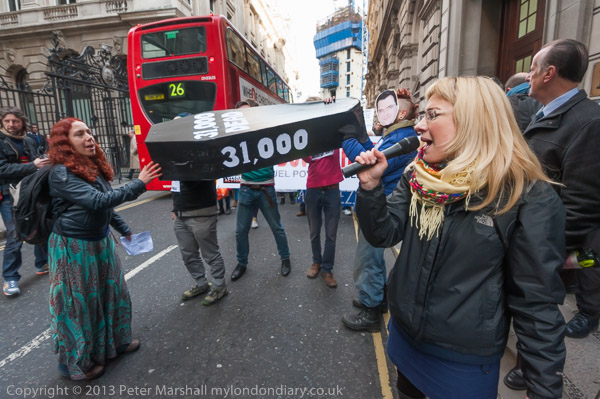
But fuel costs are rising fast and putting many energy companies out of business. Not that they were really energy companies, simply middlemen gambling to make a quick profit, buying energy as cheaply as they could and attracting customers to deals which have become uneconomic to honour as fuel prices have risen. The scheme to rescue their customers, passing them on to those companies still in business makes life tougher for those who have to pick them up, and with the latest company to go under – or at least into administration – means that either taxpayers or possibly electricity customers – we await the details – will have to shoulder the bill.
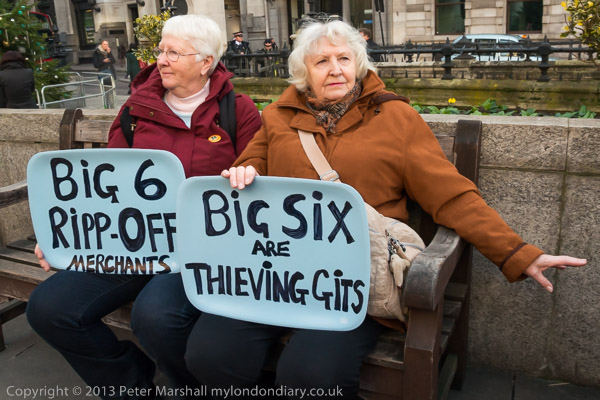
It’s a crisis that has its roots in the privatisation of the industry and the absurd belief in competition that has created an overpopulated market in companies taking a cut out of our bills, with others profiting from persuading people to switch suppliers. Along of course with a government failure to provide proper support for insulation of homes – as Insulate Britain have been gluing themselves to the M25 and elsewhere to highlight, as well as ending the building of onshore wind farms, failing to put investment into other renewable sources such as tidal power and instead backing climate-destroying wood burning and expensive nuclear schemes. The recent half-hearted support for heat pumps is yet another failure by government. We should have schemes that ensures that new build properties are built with either air or ground source heat pumps and high levels of insulation and provides incentives for them to have solar panels.
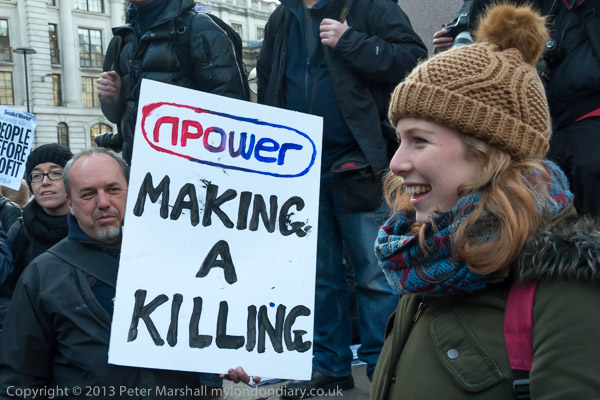
On Tuesday 26th November I went with fuel poverty activists to march to the offices of NPower, one of the big six energy providers to protest against the profiteering by them that leads to people having to choose between eating and keeping warm, causing unnecessary deaths.
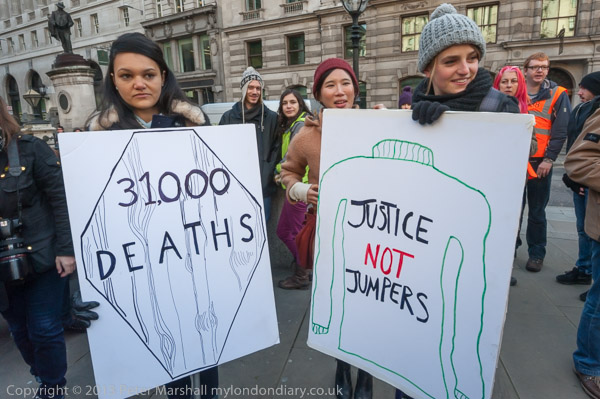
They included people from Fuel Poverty Action, UK Uncut, the Greater London Pensioners’ Association and Disabled People Against Cuts and were protesting against the huge increase in energy costs and against the deception of the energy companies who blame price rises on ‘green taxes’. The protests, in London and at British Gas’s new Oxford HQ, as well as in Lewes and Bristol were supported by other groups including No Dash for Gas, Campaign Against Climate Change, Climate Revolution, Young Friends of the Earth, Frack Off London, Power for the People, Barnet Alliance for Public Services, Lewes Against the Cuts, SOAS Energy & Climate Change Society and Southwest Against Nuclear.
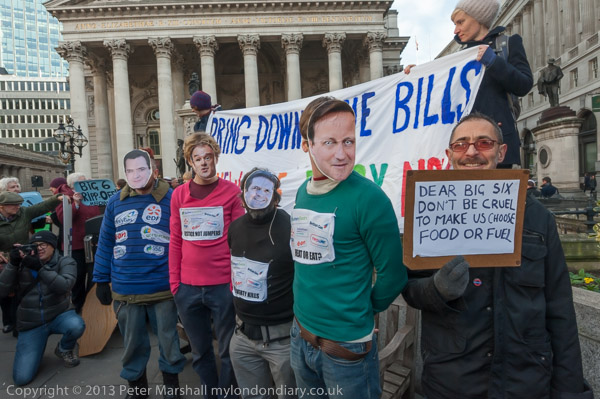
They went to the NPower offices in Threadneedle Street in the centre of the City of London because NPower is the UK’s most complained about energy company with double the customer complaints of its nearest rival EDF and higher price rises in 2013 than any of the other Big Six companies. It had then paid zero corporation tax for the past 3 years despite a 34% profit rise of £413million and in the previous winter its price hikes were estimated to have pushed 300,000 people into fuel poverty.
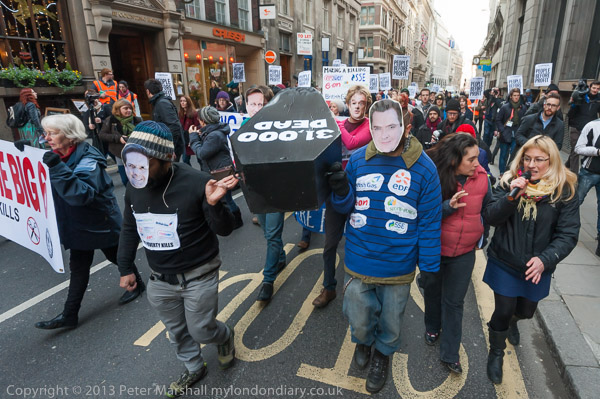
Fuel poverty leads to premature deaths – and the figure for these announced that day for winter 2012-3 was a shock, with an increase of almost a third on the previous year, to 31,000 people. The protesters emphasized this by carrying a coffin to the offices, with several of the wearing masks with the faces of the prime minister and chancellor, David Cameron and George Osborne, and wearing jumpers with the logos of major energy companies.
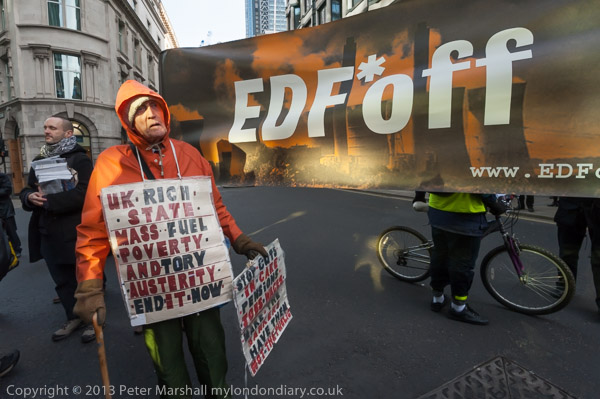
Police protected the offices of NPower while the protesters held a peaceful rally outside, where many testimonies were read from people who were having to chose between heating and eating, already cold and dreading the coming winter. In a press statement, Susan Jarrett of UK Uncut said: ‘The fact that people are dying of fuel poverty as Npower and other energy companies rake in the money and avoid tax is a scandal. This Government is not only unnecessarily cutting our services in the name of austerity but are allowing these energy companies to literally get away with murder which is why we are fighting back today.’
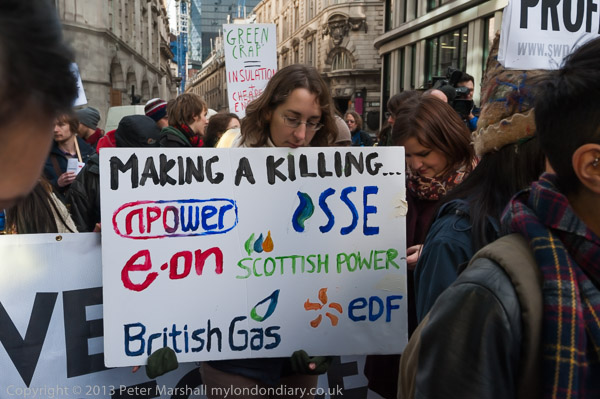
This winter fuel costs are higher. Global warming means our weather is far less predictable, and its possible we may have an unusually cold snap. Or we may be lucky and avoid extremes of cold. But if we do get them, then there will be more deaths.
4:1 legal minimum NHS staffing
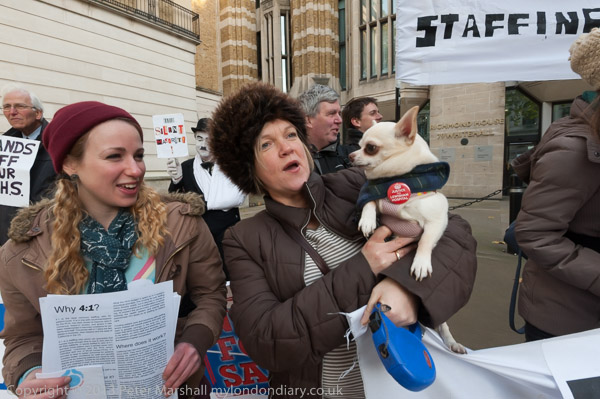
Back in 2013, the Dept of Health was still in Richmond House on Whitehall, and nurses were there to campaign for a manadatory staffing level of one nurse for every 4 patients in the NHS. They were joined by other groups protesting against closures and privatisation in the NHS. Its probably because of protests like this and many others that the department moved to obscure offices some way down Victoria St – which at least one protest I photographed marched past without noticing and got several hundred yards down the road before they realised they had missed it. Richmond House is now set to hold Parliament while the old building undergoes extensive and very expensive modernisation.
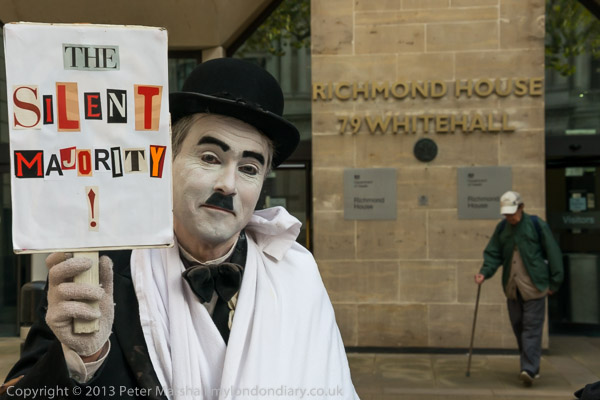
The protest was a response to various disastrous news stories about the problems of the NHS, including the RCN (Royal College of Nursing) revealing the NHS has over 20,000 nursing vacancies and the Department of Health’s decision to downgrade (effectively close) 100 A&E departments. Protesters also urged people to sign a petition calling for the NHS to be exempted from the provisions of the EU-US trade treaty then being negotiated in secret; and post-Breixt the government has made clear they will not protect the NHS in UK-US negotiations.
Cultural Workers against Zero Hours
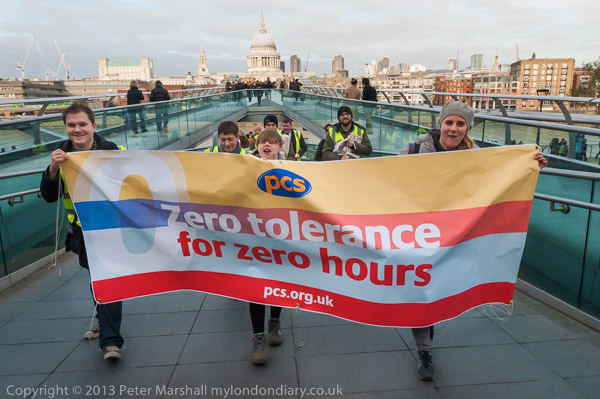
Finally I went to photograph PCS members from national cultural institutions in London at Tate Modern and on the Millennium Bridge protesting against zero hour contracts which give them no guaranteed weekly hours or income, while stopping them taking on other work. Employers use zero-hour contracts to cut wages, avoid holiday pay, pensions, and ensure the maximum flexibility and profit for themselves. Workers are also unable to take on other part-time work, as they are obliged to be available for work at the whim of the employer.
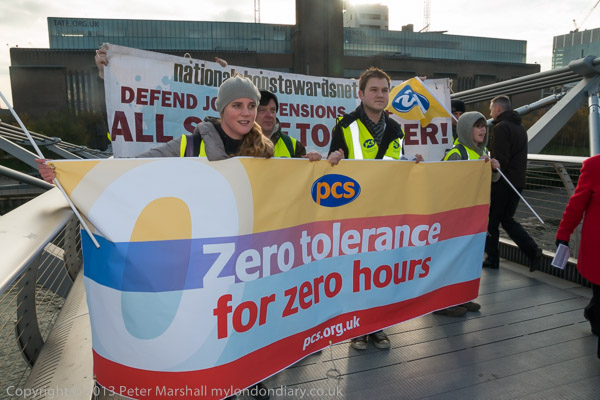
There have been some minor changes in the law and in 2015 employers were banned from requiring workers to get permission before accepting other work but zero hours contracts continue to be a problem for many workers. Workers on them have no way of knowing their income week to week and although in theory they have the right to refuse any work offered, this still often leads to them being offered fewer hours in future. And while in theory zero hours workers have employment rights, these are often denied – and virtually impossible for individuals to enforce. All workers – particularly those suffering from zero hours contracts – need to join an effective union.